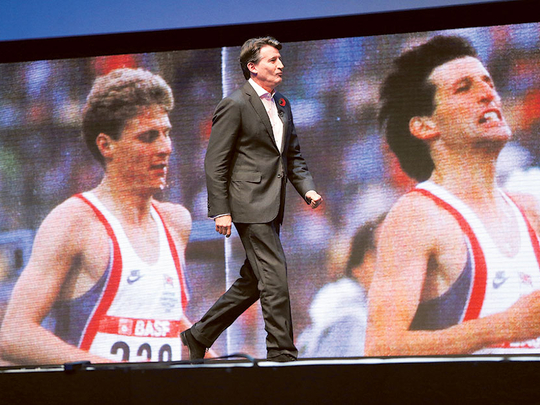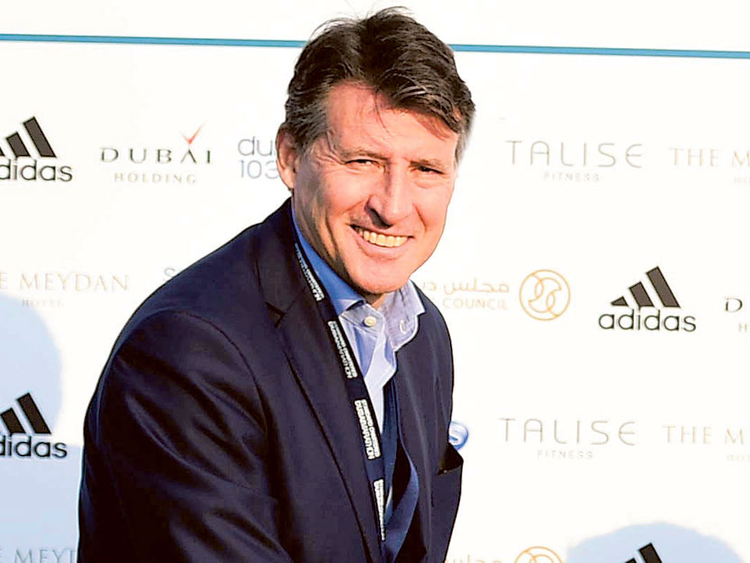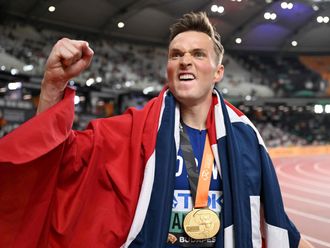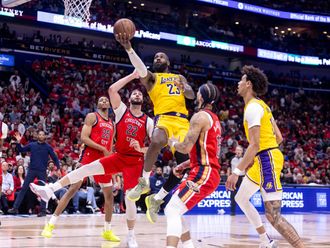
Dubai: A quiz on who’s the most troubled head honcho among the world’s premier sports governing bodies can elicit only one answer at the moment – Lord Sebastian Coe. And yet, the President of International Association of Athletics Federations (AAF) was ready with a smile during a meeting last week.
No sooner had he landed his ‘dream job’ as the IAAF supremo after a high profile election with Sergei Bubka last August, controversies had been swirling around his sport without a respite – the latest being that of sportswear giants adidas’ pullout of a sponsorship deal with the IAAF ostensibly due to the doping scandals. If it was Dick Pound’s damning report on organised doping and it’s cover-up which blew the lid on the scandal, Lord Coe’s own role as the ambassador of Nike also sparked charges of serious conflict of interest.
“It’s been a challenging period, but I tend not to view it in a personal way. It’s been a painful period for our sport,” he told Gulf News in an exclusive interview during his visit to Dubai as the guest of honour for the Standard Chartered Dubai Marathon.
It was a clear, sunny morning – just the kind of weather for the elite runners in the middle to go for their best timings – and the multiple Olympic gold medallist in middle distance seemed to be bracing for his own marathon against all odds.
It’s not that he has not been proactive in the wake of the charges, but serious questions about his silence on the ‘family rule’ of the Diacks during his tenure as a vice-president for the last eight years were waiting to be answered. “The journey back to trust will take time though, I recognise that,” he says in a somewhat sombre note, before adding: “The changes that I am implementing will make a difference, the re-structuring and reorganisation of IAAF and the proposals I have for re-building the trust should work.”
A far cry this from the scenario less than four years back, when the public profile of the star athlete-turned politican-administrator was at an alltime high. The 2012 London Olympics had just ended, and Lord Coe who was the face of it as the chairman of the bid committee and then the organising body was a man who could do no wrong. His success with the Olympic bid also made him an automatic choice to head the bidding team to bring the 2018 Fifa World Cup – though they eventually lost the race to Russia.
The question on everybody’s lips was: what next for Coe and the man himself spelt it out that it would be a ‘dream job’ for him to succeed Lamine Diack at the president of the world governing body. In hindsight, does he regret taking up the hot seat – for which he had to relinquish a 100,000 pounds-a-year ambassadorial role with Nike – not to speak of the spate of controversies?
“No, I didn’t need to do the job that I am doing now but I chose to do it because athletics had been my lifeline. I joined an athletics club when I was 11 years and remained hooked onto the sport ever since. Now in my 60th year, I am delighted to get a chance to serve the sport for at least next 10 years,” he said.
The journey which started with his local club Hallamshire Harriers saw Lord Coe emerging as a legendary middle distance runner in the early ‘80s, wth him winning four Olympic medals including back-to-back 1500 gold medals in 1980 and 1984 Games. His rivalries with fellow Britons Steve Ovett and Steve Cram formed part of the folklore in British and world athletics.
Once he hung up the spikes, Lord Coe found his calling in politics and he went on to become a Member of Parliament for Falmouth in Cornwall in 1992. The successful bid for London Olympics, however, still remains the highest point of his administrative career – a phase when he had the world media eating out of his hands.
Having seen such a high, does he often feel spited by what’s popularly called a trial by the media in recent months? A watchful Lord Coe said: “In London, we worked very closely with the media…they can be helpful but yes, you can’t them have at both places.You can’t have them just writing about the world champions and it’s inevitable that when our sport is passing through difficult times, they will be passing a judgement.”
The year 2015 had – almost by coincidence – seen sport very often creeping into the front pages of newspapers or headlines on the telly for all the wrong reasons. Asked about his take on the so-called crisis in sports governance, Lord Coe said: “It says a lot for people’s passion for sport. People are pained when they see things happening in their favourite sport - they don’t like to see what they are passionate about being dragged in the mud. To me, that’s a good thing.
The spectre of doping had, however, repeatedly cast it’s shadow on athletics in recent years – what with the 100 metres marquee duel between the all-conquering Usain Bolt and drug offender Justin Gatlin in the last World Championship being billed by the media as the battle of the ‘good versus evil.’ The Jamaican had, on that occasion, saved the Worlds with another superhuman effort, but the question has already come up as to what next, after Bolt?
“Look, Bolt is the most recognisable face in modern sport at the moment – whether in athletics, football or motor racing. We need to, however, make sure that world needs to recognise the talent that sits behind him,” Lord Coe sounded enthusiastic all over again.
“Every generation has one or two stars: Bolt a superstar now and no doubt there will be a gap when he leaves the sport. I am sure in the Sixties, people must have been talking about what happens after Muhammad Ali? Well, Sugar Ray Leonard happended … Marvin Hagler or in recent times a Manny Pacquiao and Floyd Mayweather. Fact is it’s not that we don’t have the talent, but we need to recognise and promote that talent at a global level,” he signed off.













